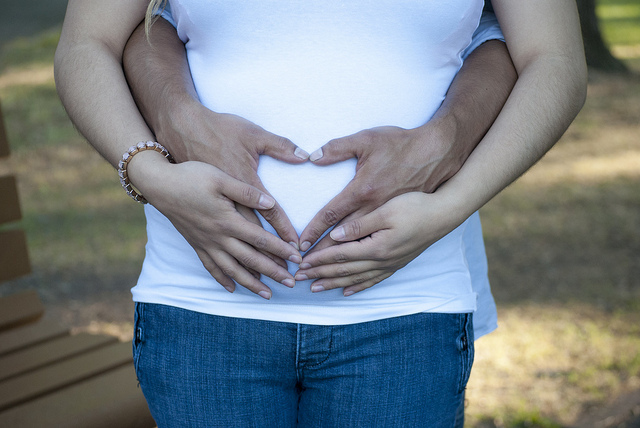 Health & Physiology
Health & Physiology
How early-life adversity gets under the skin

Many women experience mental health problems during pregnancy and this can have health consequences for the unborn child. Indeed, a wealth of research findings have now shown that women with depression and anxiety in pregnancy are more likely to give birth prematurely, to have a smaller birthweight baby and their child is more likely to experience developmental delays. It is not yet clear exactly why this occurs, but determining the biological mechanisms involved is essential if we want to prevent or reduce the harmful effects being passed from mother to child.
All individuals have a specific genetic code, or DNA, which remains relatively fixed from conception until death. However additional information in our cells helps control how that genetic code is used and this can change over time. This is called epigenetics and methylation of DNA ("DNA methylation") is one of the main epigenetic mechanisms. Epigenetics enables us to adapt and respond to the external environment and is influenced by things like the foods we eat, exercise and stress. Therefore, in addition to our genetic code, our epigenetic patterns also influence our individual traits, behaviours and risk for disease.
When an expecting mother experiences depression or anxiety during pregnancy, the accompanying chemical and hormone changes alter the environment of the foetus inside the womb. This might influence the infant's epigenetic patterns and could be an important biological mechanisms explaining the link between poor maternal mental health and infant health and development problems.
In this study, we determined whether maternal anxiety and depression during pregnancy could impact on the epigenetic patterns in the offspring, focusing on an important gene which helps control foetal growth (insulin-like growth factor 2 (IGF2) and the closely associated gene H19).
To do so, we recruited a large group of pregnant women when they attended routine hospital appointments. At 28 weeks of pregnancy we used detailed questionnaires to determine whether women had high levels of depression or anxiety. We also obtained information on the women's health and lifestyle and that of her offspring once born. A blood sample taken from the newborn baby's umbilical cord was used to measure the levels of DNA methylation of the IGF2/H19 gene in 576 offspring. We investigated a region of the IGF2/H19 gene which has been shown to be particularly important in regulating growth and the levels of DNA methylation in this region have been directly correlated with birth weight previously.
We then compared the levels of IGF2/H19 DNA methylation between groups of infants, depending on whether or not their mother experienced depression and/or anxiety during pregnancy. Our results showed that mothers who had higher levels of anxiety during pregnancy gave birth to infants with decreased IGF2/H19 methylation levels. Furthermore, when we looked more closely at this association, we found that it was stronger in lower birthweight infants and surprisingly in female babies, with no association observed in male infants.
Given what is already known about IGF2/H19, decreased DNA methylation levels in the region of the gene investigated, would lead to decreased production of the gene, and this in turn could suppress foetal growth. In the context of our study findings this is important because it provides a possible explanation for the known link between maternal mental health problems and adverse birth outcomes in the child, which could occur through changes in the extent of IGF2/H19 methylation. As of yet we have no clear explanation for why girls may be most affected, but this is the subject of additional investigation. It could relate to differences in foetal growth between the sexes; female infants typically grow more slowly and are smaller at birth on average, than males.
Further work is also underway in our laboratory to determine whether IGF2/H19 methylation in infants at birth is predictive of later health and development outcomes. And beyond this, the next important question is how can we reverse these effects and ensure that the mental health problems experienced by one generation are not transmitted to the next.
Original Article:
Mansell T, Novakovic B, Meyer B, Rzehak P, Vuillermin P, Ponsonby A, Collier F, Burgner D, Saffery R, Ryan J, Vuillermin P, Ponsonby A, Carlin J, Allen K, Tang M, Saffery R, Ranganathan S, Burgner D, Dwyer T, Jachno K, Sly P.The effects of maternal anxiety during pregnancy on IGF2/H19 methylation in cord blood. Translational Psychiatry. 2016;6(3):e765. doi:10.1038/tp.2016.32.Edited by:
Massimo Caine , Founder and Director
We thought you might like
Fighting back antibiotic resistance: a new hope from the soil
Feb 24, 2016 in Microbiology | 4 min read by Dan KramerThe colour beige: heating up the fat
Apr 1, 2016 in Health & Physiology | 3.5 min read by Caterina Da RèOne run a day keeps the...cancer away!
May 5, 2016 in Health & Physiology | 3.5 min read by Per thor Straten , Manja IdornSERINC5: a blood cell guardian against HIV
May 13, 2016 in Health & Physiology | 3.5 min read by Massimo PizzatoMore from Health & Physiology
Tobacco smoking and other exposures shut off cancer-fighting genes
Aug 31, 2024 in Health & Physiology | 3 min read by Jüri Reimand , Nina AdlerA hidden clock that times cytoplasmic divisions
Aug 30, 2024 in Health & Physiology | 3 min read by Cindy OwWhen two kinases go for a dance
Aug 2, 2024 in Health & Physiology | 4 min read by Ioannis Galdadas , Francesco Luigi Gervasio , Pauline JuyouxAwakening the thymus to cure SARS-CoV-2 infection: a matter of genes
Jul 27, 2024 in Health & Physiology | 3.5 min read by Stefano Marullo , Cheynier RemiKeeping the balance: How epigenetics monitors cancer genes
May 13, 2024 in Health & Physiology | 4 min read by Zach Gray , Madison Honer , Johnathan WhetstineEditor's picks
Trending now
Popular topics


